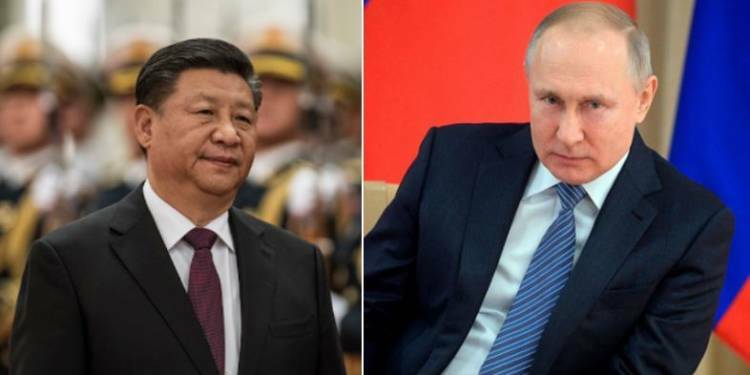Internal crises and coups often set the stage for a geopolitical contest, and the February coup in Myanmar is no exception. China was the one to play a huge gamble by trying to win favour with Myanmar’s military junta. But now, Russia’s President Vladimir Putin is looking to use Myanmar as his entry ticket into the Indo-Pacific, at the expense of China.
A recent report published by The Irrawaddy quite literally announces how Putin’s Russia has made a grand entry in Myanmar. On March 27, Russia’s Deputy Defense Minister Alexander Vasilyevich Fomin appeared in his full colonel-general uniform, at the Armed Forces Day celebrations in Naypyidaw.
Fomin’s appearance is actually quite symbolic and operates as a statement of Russia’s intent to strengthen Russian-Burmese military ties. However, it is far more complicated than you think. In fact, Russia’s presence in Myanmar harms China more than anyone else.
The presence of the Russian Deputy Defence Minister is literally the first good thing that has happened for Myanmar’s military junta since the February coup. Till now, the military junta seemed completely isolated. The western democracies are actually getting hostile towards Myanmar’s military junta for obvious reasons.
Other powers like India and Japan too have been hesitant and have sought to maintain a safe distance from the Burmese military. India and Japan cannot afford to support an anti-democracy regime, but Russia can do that.
Beijing, on the other hand, does seem more interested than ever to mark its presence in the Southeast Asian nation. In fact, China’s footprints in enabling the coup against Aung San Suu Kyi, the former State Counsellor of Myanmar, were quite visible. But this was a gamble by China that failed spectacularly because the Burmese military remains averse to Chinese presence. So, this is exactly where Putin wants to cash in.
Russia’s entry into Myanmar gives the Burmese military that one good alternative to Beijing, it was always looking for. Myanmar’s military junta does not want to get completely reliant on Chinese armaments, because, within Myanmar, it is well understood that Beijing cannot be trusted.
The senior Burmese military leadership does understand that it is China, which has supported Burmese insurgent groups like the Arakan Army (AA). The paper dragon hedges its bets between the military junta and the Burmese military. So, for the Burmese military, it is natural to be a little averse to China and also to be conscious of the inherent risks associated with getting too close to the Chinese People’s Liberation Army (PLA).
Russia, on the other hand, is a refreshing option for Myanmar that does not bring along any baggage with its military supplies.
In this sense, Myanmar is a brilliant opportunity for Putin. The military junta is waiting for a huge military-industrial complex to come to its rescue, and Moscow can provide exactly that to Myanmar. In doing so, Russia would be harming China’s Myanmar ambitions and perhaps even agitating the anti-China sentiment within Myanmar. Yet, Putin does not seem to care about Xi Jinping’s interests.
Simply put, Putin is ready to cut the BRI projects in Myanmar to size, in order to power Russia’s entry into the Southeast Asian nation.
In fact, what Russia’s entry in Myanmar also does is that it actually allows Moscow to pursue its Indo-Pacific interests more overtly. Till now, Russia was indirectly involved in the highly strategic region though Russian policymakers continued to criticise the Indo-Pacific concept as superficial.
However, once Russia’s military industry starts shipping military hardware and ammunition into Myanmar, Moscow would be directly competing with China for influence in the Indo-Pacific. Even without admitting its interests in the Indo-Pacific, Russia will get involved very deeply.
China itself does not fancy any external competition in Myanmar. Chinese Foreign Minister Wang Yi also issued a warning, asking ASEAN to alter against external interference. Yet, Putin seems undeterred.
There is, of course, a domestic angle behind Russia’s latest bid to gain a foothold in Myanmar. Putin is presently trying to consolidate himself for the future. The 68-year old leader has signed the law that allows him to stay in power till 2036.
Yet, Putin would not feel very secure within Russia. In order to sustain his extended stay, Putin needs a sense of purpose and enormous public support. He needs to tell Russians as to why he must stay in the Kremlin for another one and a half decades. And an entry in Indo-Pacific via Myanmar can be that one big job for which Putin stays in power for some more years.
Putin’s Russia is therefore entering the Indo-Pacific. The route taken passes through Myanmar and the biggest collateral casualty is China.
